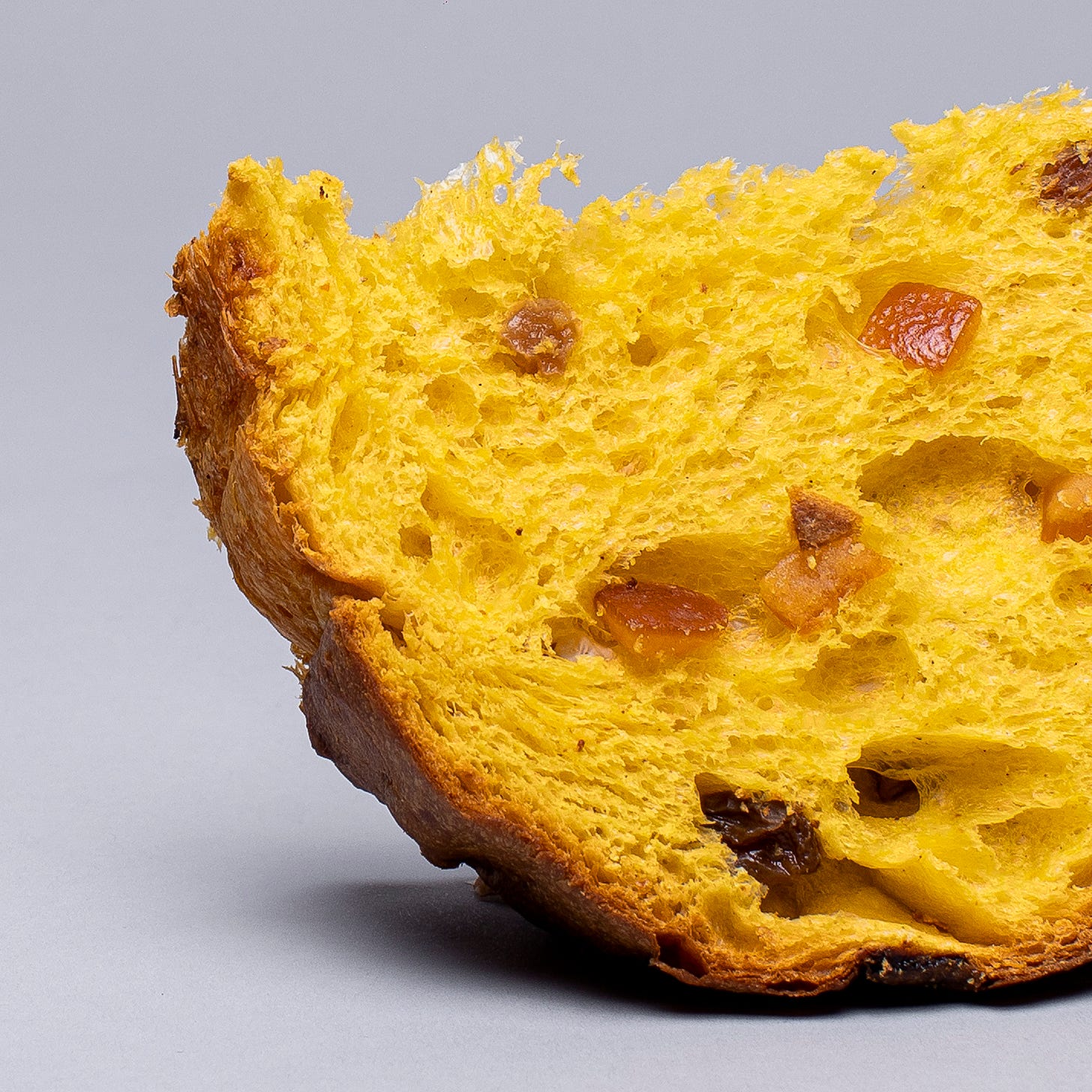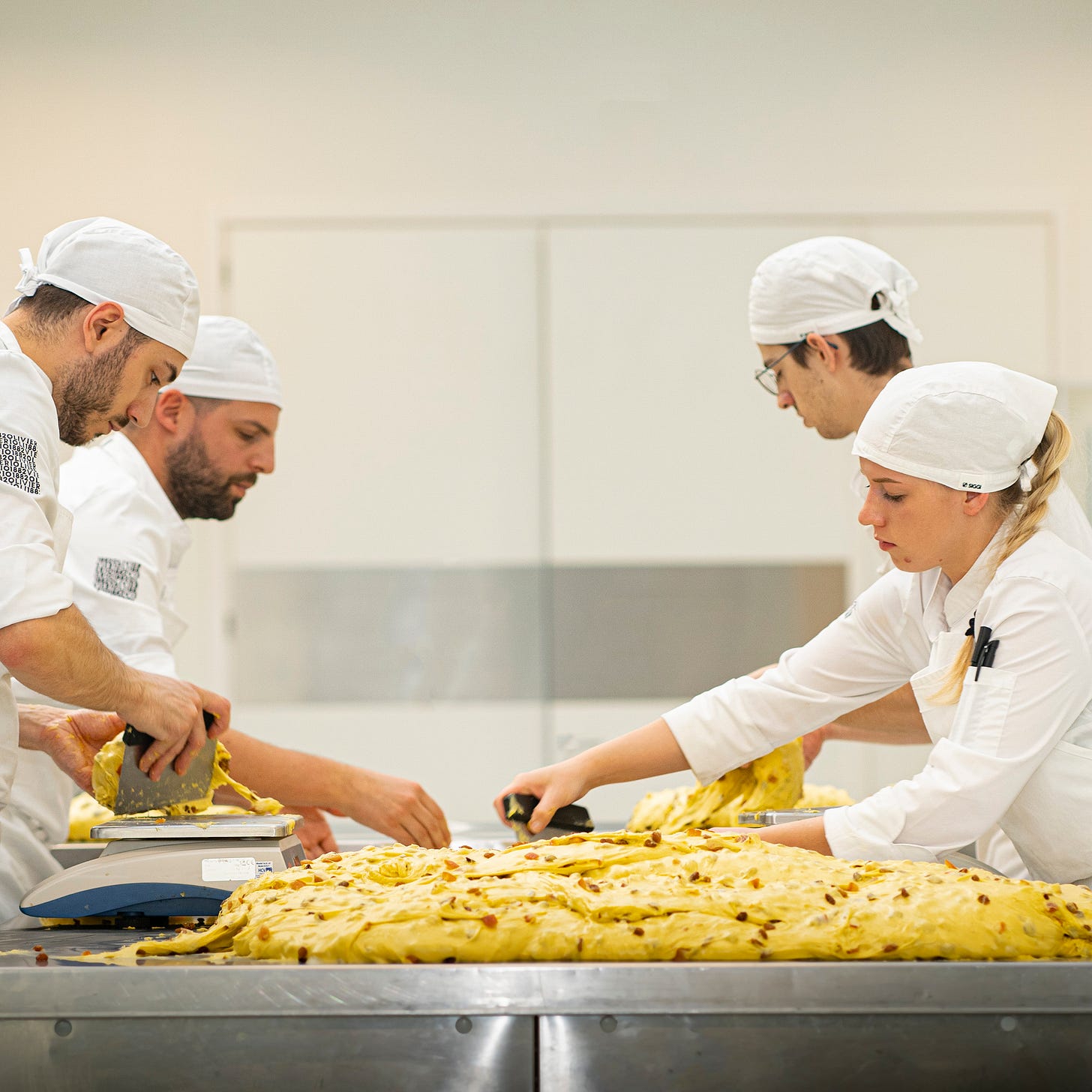In Italy, Christmas means the scent of panettone wafting through the air—and there are few people who know that smell better than Nicola Olivieri. His family’s artisanal bakery in the small town of Arzignano in the Veneto region has been operating for more than 140 years, and while in the beginning it focused mostly on bread, in its more recent history, it has become famous for its award-winning panettone. According to Nicola, it’s the only Italian bakery that ships its panettone to the United States within 48 hours—so if you order one now you can still get it in time for Christmas.
I have yet to visit the bakery in Arzignano, but I have tasted Olivieri 1882’s panettone and can attest to its excellence. The following is a virtual interview with Nicola that I did in connection with an assignment for Italy Magazine (linked below, in the Further Reading section). I’m thrilled to share his insights as part of my series of interviews with entrepreneurs and creatives in Italy.
Has your family been making panettone since the very beginning when the bakery first opened?
No, at the beginning it was just bread. My grandparents started to develop some new, sweet products, such as the panettone, which was the first one that we created after bread.
I know your bakery is now super famous for the panettone and has won many awards for it. So I was curious to know when that became such an important product for you guys.
Essentially, when our generation—so me and my brother Andrea, who is the Director of Sales and Marketing—started working for the company around 10 years ago, we started to focus mainly on these kinds of products with the goal to produce and distribute in super premium markets all around the world.
We rebranded everything, so we took the brand and started to think in another way—not only about having the best product possible, but also communicating that in a different way—very different from what people can expect from a traditional Italian bakery. We would like to communicate in a contemporary way.
Did you always know ever since you were a little kid growing up that you would be involved at the bakery one day?
No, not really. Of course, we grew up in the bakery because it's always been a very small bakery. We used to live upstairs from the bakery, which was on the ground floor. So every day we came through the bakery, so we always saw our family, our parents, our uncles, and then nonna, our grandmother working in the bakery.
For us it was something very normal, so that's why we took different paths after school. I didn't study at a bakery school. I studied at liceo, a normal high school here in Italy. And then after I lived in Australia, I decided to come back and try to take care of the family business with my brother.
So for a product that has its origins in Milan, why do you think that your bakery has so much success with panettone considering the rivalry between Lombardy and Veneto?
In Veneto we have a very good school for leavened cakes. For example, you might know the pandoro tradition, which originates in Verona, and right now, there are more panettone and pandoro producers here in Veneto compared with Lombardia because Veneto has always been a land of bakers.
For a baker, everything is a challenge, so we used to make only pandoro, but why not try also panettone? So that's why we took on it. Right now in Italy, I think every region has its own panettone producers, which is very, very good. Because our panettone is very different from the ones made in Campania, for example, which are mostly filled with creams or something like this.
We like to be more traditional in this way, but we are very curious. So we have 21 different types of flavors. Like different fruits, different pairings and such. But yeah, the panettone from Milan was maybe the first and only and then it spread all over the country.
Panettone is not protected like a DOP product the same way that Parmigiano Reggiano is for example, but I read that there are some laws which actually say what can and cannot be used to make panettone. Do you guys follow those rules? Or do you take your own spin on it?
Of course yes, because there is a panettone disciplinare. There are the rules to declare panettone in the packaging. So a minimum quantity of butter and egg yolks, etc, etc. For example, comparing the disciplinare and our recipe, we use four times more egg yolks in the recipe, and we follow strictly these disciplinari.
As you can see on our website, we have two types of panettone that cannot be named as panettone: the olive oil one and the vegan one. As they don't have any kind of butter inside, we cannot say it’s panettone, but we call it Christmas cake.
Is there something that sets apart a panettone from Veneto, instead of one from Lombardia or from Campania?
I think no honestly. What I can see is maybe in Veneto it’s more traditional, there's less creams than in Campania for example. But surely, in Campania there is someone that can do panettone or pandoro in the Veneto style. And also in Veneto, someone can do panettone with cream. This is the main difference that I see right now. There is no other difference.
Nevertheless, I'm very curious, because we are very innovative with the flavors and everything we put into the process because we are also collaborating with the University of Padua. And we studied a very typical production process. So our panettone takes four days in total of natural long fermentation.
The texture should be the original panettone, not these big empty bubbles, I think you want a full slice and not an empty slice.
It's really difficult to make them, isn't it? It’s one of the most difficult leavened products to learn to make. So what was that process like for you? Have you mastered the art of panettone baking?
Yeah, I used to see it in my family, so I always knew that panettone was one of the most difficult cakes to make in the bakery world. So it’s always been very attractive to me, because I really like challenges. I always liked seeing the process. Then of course, I collaborated with other master bakers and tried to understand their techniques. I studied the fermentation, and I took my path.
For me, honestly the most difficult leavened cake is not panettone, it’s pandoro. It is very difficult to make it. That’s why there are very few pandoro producers. Because with panettone, if you are off by one degree, for example, you can try to finish the dough and the process—and you will be able to have a very good panettone as well. For pandoro, if you're wrong by one degree, it is impossible to take it out of the oven, so it’s very hard.
You mentioned that you make 21 different flavors now and I got to try the one with the apricot and salted caramel, which was really fantastic. But I'm curious, which are the most popular flavors?
Of course, it’s always the classic panettone, which is my favorite too. And then we have the triple chocolate, which is another one of our bestsellers. And this year we also have the limoncello panettone, which is one of our bestsellers. It's very popular in the United States. And it's very good because it's not with cream, but it's filled with limoncello.
Is that a new flavor for this year?
It's a new flavor for this year. It's kind of a babà, you know, it's kind of moist. So it's different. We have created a dedicated line which is like our liquor line. We do panettone and pandoro with grappa after baking. We do, for example, panettone with rum and dark chocolate and also this one with limoncello.
I was going to ask what's your favorite but you said the classic one, no?
The classic and then if you asked me, the rum and dark chocolate.
And how many panettone are you guys producing nowadays?
We have a production facility of about 1,000 per day, which are completely made in an artisanal way. So we don't have any industrial machines. We have more mixers for the dough and more ovens. We have the same techniques as when we did a hundred panettone per day, but we are a larger team. And some departments only do the baking, some only make the dough, some only do the shaping, etc, etc.
This is very unique, because it's very hard to find an artisan doing these pieces in the same way. And it's why Gucci has chosen us as their producer for Tokyo and Seoul, we are producing for Fortnum & Mason in London, we produce also for Printemps and also other very big companies, for the Peninsula Hotels and these big brands because we can guarantee a very high quality standard.
What percentage of them get exported?
In our production, I think half.
Half get exported, so half of them stay in Italy.
Yeah, which is always a very good market for us.
And you ship them also all over Italy, right?
Oh, yeah. But it’s faster in New York than in Rome or Milan.
Really?
Yeah, don’t ask me why. I don't know, but it’s like this.
And are you producing panettone all year round? Or is it mainly just for Christmas?
We started with a summer panettone, but it's very difficult with the temperature. So we start in September, and then we go through Christmas until February. Then we have Easter, so the colomba, and after we stop.
So where can readers find your panettone?
They will surely find it on our website. They will find it on Goldbelly. Also Eataly. We are collaborating with Giada De Laurentiis, with Giadzy, so we created a double chocolate panettone too. And also in some other high quality delicatessens and fine food shops all around the United States.
Further Reading
My article for Italy Magazine retraces the origins of panettone to 14th century Milan and asks: Can you get genuine panettone outside Milan?
In case you missed it, I included Olivieri 1882’s panettone in last week’s gift guide.
Food & Wine editor Sam Gutierrez raves about Olivieri 1882’s panettone with balsamic vinegar of Modena in this article.
While researching my piece for Italy Magazine, I read this culinary history of panettone in Smithsonian Magazine.
I also read this New York Times feature about panettone and how contemporary bakers are playing with this traditional Christmas cake (unlocked).
You can see all the interviews in this series here.










Great story. I really believe the pride and creativity of these kinds of artisans is Italy’s greatest strength. It’s so beautiful how they keep the culture not just alive but evolving. Cars, shoes, fabrics, pizzas, panettone, it just seems to go on and on.